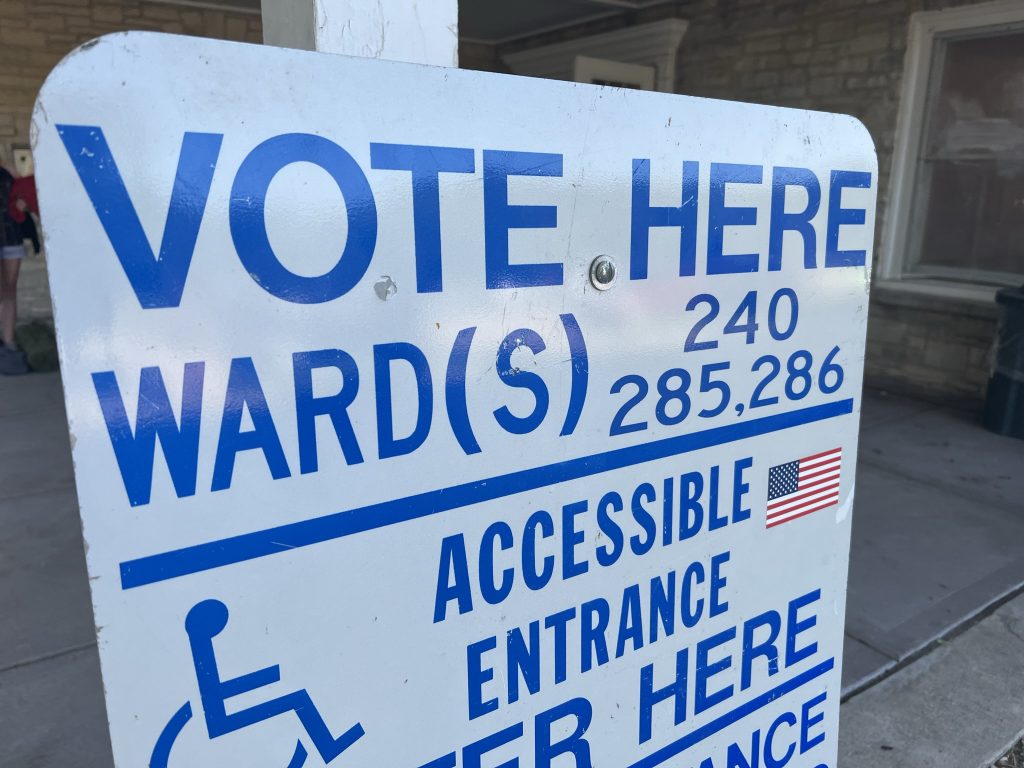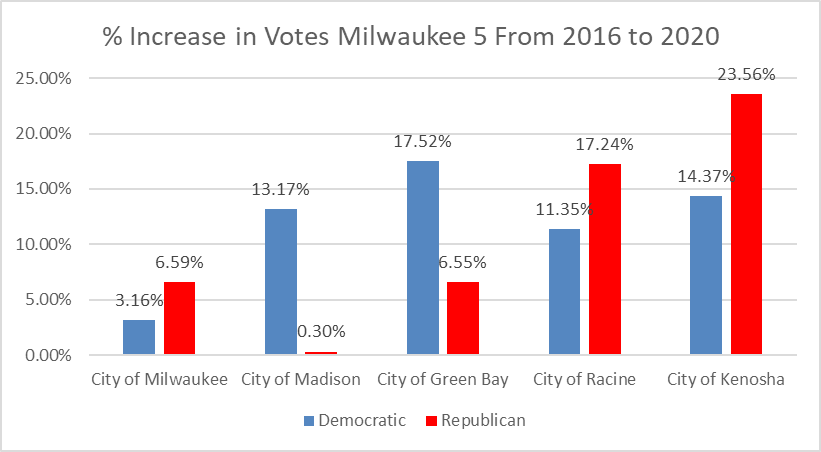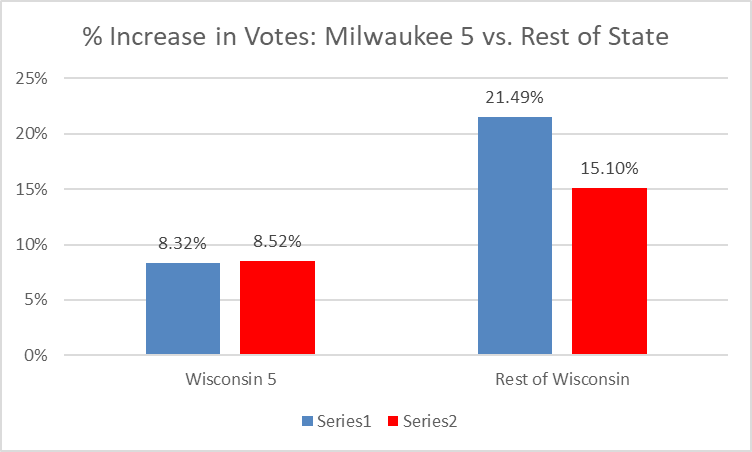All About Wisconsin’s ‘Zuckerbucks’
If anything the funding helped Trump, election data suggests. So why are Republicans angry?

Vote here sign outside a Milwaukee polling place. Photo by Jeramey Jannene.
A series of grants made to election administration agencies in 2020 was greeted with fury by the Republican establishment. These grants aimed at helping election administrators in Wisconsin and other states respond to the COVID-19 virus.
Wisconsin held its spring nonpartisan election in the first week of April 2020, just as the first wave of the pandemic hit. Given the timing, there was a reasonable fear that in-person voting could spread the disease to both voters and poll workers. Many poll workers were retirees and fit the demographic most vulnerable to catching the virus and dying from it. As a result, many decided not to help out.
If Wisconsin’s low-turnout spring election was so badly affected by the pandemic, how much worse would it be for the much higher turnout general election in the fall? Among other things, the demand for absentee ballots was likely to explode. Clearly, agencies that administered elections needed to change in response to the changed environment, but neither the state nor the federal government was forthcoming with the necessary resources.
In response, an organization called the Center for Tech and Civic Life (CTCL) offered grants to all American election agencies. Any agencies responding to this offer would receive a grant of at least $5,000 and in many cases much more. According to CTCL’s Form 990, these grants were funded by 22 contributors, with over $300 million from the foundation of Mark Zuckerberg, the founder of Facebook, and his wife, Priscilla Chan.
In Wisconsin, the bulk of the funding went to the state’s five largest cities, Milwaukee, Madison, Green Bay, Kenosha, and Racine. It appears that CTCL was favorably impressed because the five cities submitted a joint proposal that promised to work together to share their experiences.
The immediate reaction on the right was outrage. Typical was the Wisconsin Institute for Law and Liberty (CTCL), which quickly concluded these grants were disguised political donations, aimed at helping Joe Biden win Wisconsin and the presidency. Following the 2020 presidential election WILL issued a report, entitled “Finger on the Scale: Examining Private Funding of Elections in Wisconsin.”
Several lawsuits were brought against the grants. All were rejected by the courts.
Yet there has been fury of Republicans condemning “Zuckerberg grants” or ‘Zuckerbucks.” Since the 2020 election, 20 states dominated by Republicans have passed laws banning grants aimed at improving election administration. In the event of a future crisis affecting elections, these laws would prevent agencies in these states from accepting help from the private sector while leaving agencies in Democratic states free to accept offers of help. The ironic result could be a higher turnout in Democratic states and a lower turnout in Republican states.
There are several reasons to doubt that the CTCL leaders were motivated by a desire to help Biden win the election. First, the effort was an inefficient way to do so. CTCL’s Form 990 includes a list of grant recipients that runs to almost 300 pages. Most are in states that are safely Democratic or Republican, with little prospect of flipping their Electoral College vote from one party to the other.
For example, if the goal is to have the Democratic candidate win the election, why send $1.2 million to Montgomery City and County in heavily Republican Alabama, which Trump won easily? Conversely, why send $8 million to Los Angeles, in a state that is already a lock for Democrats? Unless one assumes that CTCL is incompetent, the obvious conclusion is that CTCL’s aim was what it said it was: to improve the process of voting.
WILL complains that the distribution of grants favored cities. Yet it appears that cities faced particularly severe challenges in dealing with Covid, as evidenced by Milwaukee’s long lines. Of Milwaukee County’s 18 cities and villages only two — Milwaukee and West Allis — applied for grants. Apparently, the other cities were confident that they already had the resources needed to meet the Covid challenge.

% Increase in Votes Milwaukee 5 From 2016 to 2020
Put it all together, Trump’s gain in the Milwaukee 5 cities slightly exceeded Biden’s, as shown in the graph below. If the vote in the rest of Wisconsin had followed the same pattern, Trump would have been reelected. Instead, Trump lost the election because his vote increase lagged Biden’s in the rest of Wisconsin. Put another way, Biden’s vote increase in Trump country, not in those five cities getting the CTCL grants, was responsible for Biden’s victory in Wisconsin.

% Increase in Votes, Milwaukee 5 vs. Rest of State.
Republican attacks on the grants show more about the current state of the Republican Party than the grants. For the dominant faction of the GOP, winning elections has become paramount, far more important than protecting democracy. They project this view on the other party. As a result, they can only understand charitable grants made to help make voting easier and more secure as a secret plan to win an election.
If you think stories like this are important, become a member of Urban Milwaukee and help support real, independent journalism. Plus you get some cool added benefits.
Data Wonk
-
Why Absentee Ballot Drop Boxes Are Now Legal
 Jul 17th, 2024 by Bruce Thompson
Jul 17th, 2024 by Bruce Thompson
-
The Imperial Legislature Is Shot Down
 Jul 10th, 2024 by Bruce Thompson
Jul 10th, 2024 by Bruce Thompson
-
Counting the Lies By Trump
 Jul 3rd, 2024 by Bruce Thompson
Jul 3rd, 2024 by Bruce Thompson




















Because they are ignorant cheaters safely protected by there gerrymanderd districts. Knowing that they wouldn’t hold office in a fairly mapped districts.
Why are rCons angry? 1) they are addicted to outrage entertainment (tucker c, sean h, boebert, green, et.al.)
2) they believe what they’re told to believe, creating a self-fed loop that becomes “logic”. Their self-righteous money worshipers in the closet.